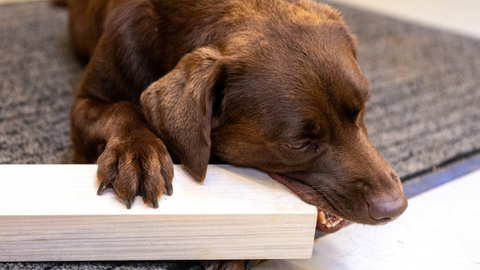
Understanding Dog Behavior Problems With Solutions
November 09, 2021We treat our dogs like family. They provide happiness, companionship, and give us unconditional love.
Since dogs tend to be playful and active, they might do some bad stuff and misbehave. As a dog owner, it is important to understand common behavior problems. Preventing issues to occur and knowing what to do can make a big difference.
Common Dog Behavior Problems
- Barking
- Chewing
- Play Biting
- Digging
- Chasing moving things
- Separation Anxiety
- Begging
Though these are the most common dog behavior problems, they are also part of your dog’s DNA and innate behavior.
Excessive behavior from the list above is not good and if left unchecked, it can get extreme. Good thing, there are some ways on how we can help reduce or stop those issues properly.
Some dog owners start to train their pups. Starting early can be beneficial to dogs as they can get familiarized with their training. There are plenty of ways on how we can encourage positive behavior in a new pup.
Here are some tips on how we can address the most common behavior problems
1. Barking
Reasons why dogs are barking:
- Communicate
- Greet others
- Express aggression/anxiety
- Playfulness or excitement
- Wants to get attention
- Give warning for a potential danger

Excessive barking is considered a behavior problem. A great way to prevent barking is to know what causes it then remove any potential sources of the behavior. The most common cause of the barking is aggression. Research suggested that genetics and environment play a big role in dog aggression.
Train your dog by starting with basic commands like “sit” and “down” in order to shift the focus from barking and reward your dog for good behavior. Quiet commands like “Hush,” “Quiet,” or even “Stop” is common behavioral training so use it whenever necessary.
2. Destructive Chewing
Reasons why dogs are chewing:
- Relieving stress
- Anxiety
- Frustration
- Cleaning their teeth
- Keeping their teeth strong

Dogs explore using their mouth and sometimes our furniture and personal stuff are what’s keeping them busy. They love slippers, shoes, sofa, passports (uh-oh!) and just about anything available.
Research says, 94% of dog owners provided their dogs with edible chewing material. Give your dog chewable snacks to stimulate their oral sensory. You can also give them exciting chew toys. Dog-Proof your house and put away all the things that you don’t want to be destroyed away from your dog’s reach. Chewing deterrents can also help prevent your dog from chewing clothing and fabric, apply a significant amount of it. We cannot stop them from chewing but we can redirect it.
3. Play Biting
Reasons why dogs are biting:
- Express playfulness
- Fear
- Protection of property
- Sickness or Pain
- Predatory Instinct

Any dog can bite. According to a study from the Center For Disease Control (CDC), an estimated 4.7 million dog bites occurred in the United States, and approximately 799,700 persons required medical care.
Most of the time, dogs bite because of fear or protectiveness. They may feel sick or often want to be alone. There are plenty of ways that you can prevent your dog from biting someone.
Socialize your dog, introduce him to new places and people as often as possible. Getting them familiar with their surroundings can get them secure and less threatened. A well-socialized dog is far less likely to be fearful in new situations, and lack of fear decreases the likelihood of aggression. Given the circumstances, any dog can bite, a lot of people get bitten because they are confident that the dog doesn’t bite. A certain breed and size won’t guarantee that they won’t bite.
Work on obedience training, as a dog owner, if you can control your dog’s behavior and help calm their anxiety, it is less likely to bite. Be aware of your dog’s body language, a dog who is afraid is most likely to bite.
4. Digging
Reasons why dogs are digging:
- Boredom
- Excitement
- Genetics
- Burying their toys and chewable
- Escaping

Many dog owners are getting frustrated when their dogs are digging since the garden is getting destroyed by their paws. Some dog breeds are innate hunters like terriers and small hounds. Some dogs are just escaping artists and just being playful by digging. Understanding why the dog is digging is an important tool in controlling the behavior.
One way to minimize digging is ensuring your dog is getting enough mental stimulation and physical exercise every day. This will help with boredom and anxiety. You can also give your dog puzzle toys. Every time you catch your dog digging at an appropriate place, redirect them to another activity like fetching a ball. Reward this behavior with praise, petting, and treats so your dog comes to see that new action as more rewarding than digging.
5. Chasing
Reasons why dogs are chasing:
- Predatory instinct
- Boredom or anxiety
- Territorial threat

Some dogs love chasing moving things like cats, bikes, joggers, vacuums, and many more.
This behavior is easy to correct with proper training like using voice commands such as voice commands like “Sit” or “Stop”. You can also walk your dog outdoors so he can see that moving things are a normal part of the world.
Some activities that you can try with your dog who loves chasing are fetching, hide and seek, and tag. Having enough stimulation can help reduce chasing behavior on your dogs.
6. Separation Anxiety
Symptoms of Separation Anxiety
All things below are manifested by the dog once the owner leaves
- Pees everywhere
- Bites everything
- Anxious

Our dog gives us unconditional love and that is why whenever we leave them, they are having a hard time without us which results in misbehaving and destroying anything possible. What you can do is train your dog to be happy on his own. You can also check some ways to keep your pet calm during separation anxiety so that both pets and owners can enjoy their time apart without any stress or panic attacks.
7. Begging
Dogs love food and they give you the irresistible puppy eyes which makes it hard not to give them what they want. Remember, feeding your dog with scraps from time to time can damage their health which results in obesity. One study cites that at least 33% of the dogs presented to veterinary clinics are obese. Obesity shortens a dog’s life and makes them more likely to develop disease such as osteoarthritis, respiratory distress, some forms of cancer and many more.
Before you eat, tell your dog to go to their own place or confine them in another room until everyone is finished eating. Train your dog using basic commands and reward them if they obey.
Most common behavioral problems can be solved with proper training. Use different strategies and observe what works well with your dog since they also have unique personalities. Rewards are better than punishment. We always recommend consulting your vet and seek a professional dog trainer if you still have trouble with your dog’s behavior.
